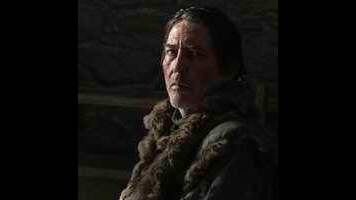“The Seven Kingdoms need someone stronger than Tommen, but gentler than Stannis. A monarch who can intimidate the high lords and inspire the people. A ruler loved by millions with a powerful army and the right family name.”
The back-and-forth that follows demands more time spent with the comedy duo of Conleth Hill and Peter Dinklage. It also lands on one worthy candidate who fits all of Varys’ prerequisites: Daenerys Targaryen. But Emilia Clarke’s character isn’t the only one who fits that description. Jon Snow is hitting all of those intimidate/inspire notes at Castle Black, and his actions at the conclusion of “The Wars To Come” demonstrate his deep reserves of mercy. He still has two sisters out there, and the one who appears this week just removed her last major obstacle to controlling The Eyrie, leaving Robin to fend for himself at some sort of finishing school for young megalomaniacs.
And then there’s Margaery Tyrell, who smirks and slinks her way around the premiere, torturing her mother-in-law from afar and interrupting a brother who’s being rather brazen about his sexual exploits. In the latter scene, breakin’-all-the-rules Loras argues that his sister’s scheming will lead only to an eternity with Cersei Lannister, but Margaery has other ideas. When Natalie Dormer responds with a most ominous “perhaps,” she makes Rhaegal and Viserion look like geckos. The dialogue of “The Wars To Come” weighs a ton, even when the sentences are one-word long.
The episode plays a lot of tricks of scale like that. Tyrion sees the world, but only through a hole in a crate. Daenerys’ followers yank the winged idol from the top of the pyramid, yet their queen is a speck on the screen next to pets she used to hold in her hand. Her fellow self-proclaimed monarch, Mance Rayder, is reduced in size by composition and wardrobe, appearing so small and so defeated when Jon visits him in his cell. Brienne, a knight with no lord to serve, nonetheless threatens to buckle the upper reaches of the frame when filmed from below. In an atmosphere of uncertainty, when a boy sits on the Iron Throne, the established hierarchies of Game Of Thrones are thrown into confusion, and “The Wars To Come” represents this confusion visually.
If the words of David Benioff and D.B. Weiss’ script resound with rhetoric, it’s because “The Wars To Come” is a series of stump speeches. In terms of real-world events, the season five premiere has excellent timing. With a presidential election on the horizon, the voting public is meeting (or re-meeting in many cases) the candidates who deem themselves worthy of sitting in America’s own Red Keep. It’s campaign season in Westeros, too, where the incumbents are throwing lavish parties and their longtime opponents are pulling out the pyrotechnics. Over in Meereen, Daario presses Dany on the importance of compromise. The people with money and influence are deciding which contender they’d like to throw their weight behind. Mavericks fire long shots. Insiders plot sabotage. “The Wars To Come”’s resolution depends on the decisions of a warrior, but its climax is initiated by the machinations of an advisor: Jon holds the bow, and Stannis gives the address, but Melisandre starts the fire.
There are compelling stories to be told within that context, but they’re not “The Wars To Come”’s to tell. The season premiere must serve as prologue, and it serves honorably—and given its occasional lack of stimulation, “serves” is an apt verb here. With lots of talk and little action, the episode will likely catch some flak for stalling. (Did you sense a disturbance when Sansa and Baelish’s carriage passed by Brienne and Pod right after they were talking about finding Sansa? As if millions of voices suddenly cried out, “She’s right there!”) The night ahead of Game Of Thrones is dark and full of empty pages, so Benioff and Weiss need to be sparing with what source material they have left, right?
But that’s another important aspect of that final scene. If stalling were truly at play, wouldn’t Mance’s execution be delayed for a few more episodes? His death is more than a signpost of change or a show of Jon’s leadership style—it’s also an indication that Game Of Thrones isn’t afraid to move forward with what it’s been given. As Benioff and Weiss prepare to take their show over the Wall and beyond the bounds of A Song Of Ice And Fire, it’s not as if they’ve run out of tragic shocks and epic heroism. Sometimes you just have to wait for them to get there.
And if you refuse to be that flexible? Sticking by your convictions can earn you a beautiful throne room in the type of massive stronghold Dany now occupies. But it can also get your foot soldiers killed, or yourself burned at the stake. While it contemplates the kind of leadership it will next put onscreen, the leadership behind the scenes at Game Of Thrones looks refreshingly willing to roll with the punches.
Stray observations:
- Welcome back to The A.V. Club’s Game Of Thrones (newbies) coverage. I’m glad to be back on the beat, and glad to have you along for this voyage across the Narrow Sea of things George R.R. Martin has published. It’s stated above, but it bears repeating here: If you’ve read the books the series is based on and would like to discuss events that have yet to occur (or even the events that won’t occur in the show), we have a separate review for that type of discussion. Myles will be pleased to have you in the Game Of Thrones (experts) comments, and your fellow readers will be pleased to enjoy Game Of Thrones on their own terms. And if you’re the type of person who’s found themselves in possession of the next three episodes of season five, please keep any information about those episodes to yourself.
- These characters feel increasingly without adversary. Roose Bolton is alluded to, but with Tywin on a slab and Mance Rayder at the stake, Cersei stands tallest among the show’s villains. The beginning of every new Game Of Thrones season feels like a bit of a refresh, but this one requires more recalibration than most.
- There’s probably a whole separate essay to be written about how every one of Cersei’s insecurities is rooted in that fateful encounter with the witch. At the very least, it gives us the very Cersei put-down “You’re not terrifying—you’re boring.”
- In the first four scenes of the premiere, there’s blood, a corpse, vomit, nudity, and more blood. Game Of Thrones is back, baby!
- “I’m not a knight, that means you’re not a squire.” Other things Brienne is not: a) Podrick’s mother, b) happy with the current state of her sword, c) considering that any carriage that passes by might be carrying Sansa.
- Varys gives Tyrion two choices: Drink himself to death in Pentos, or join him on the journey to meet Dany. Tyrion finds a third option, though: “Can I drink myself to death on the road to Mereen?”









































